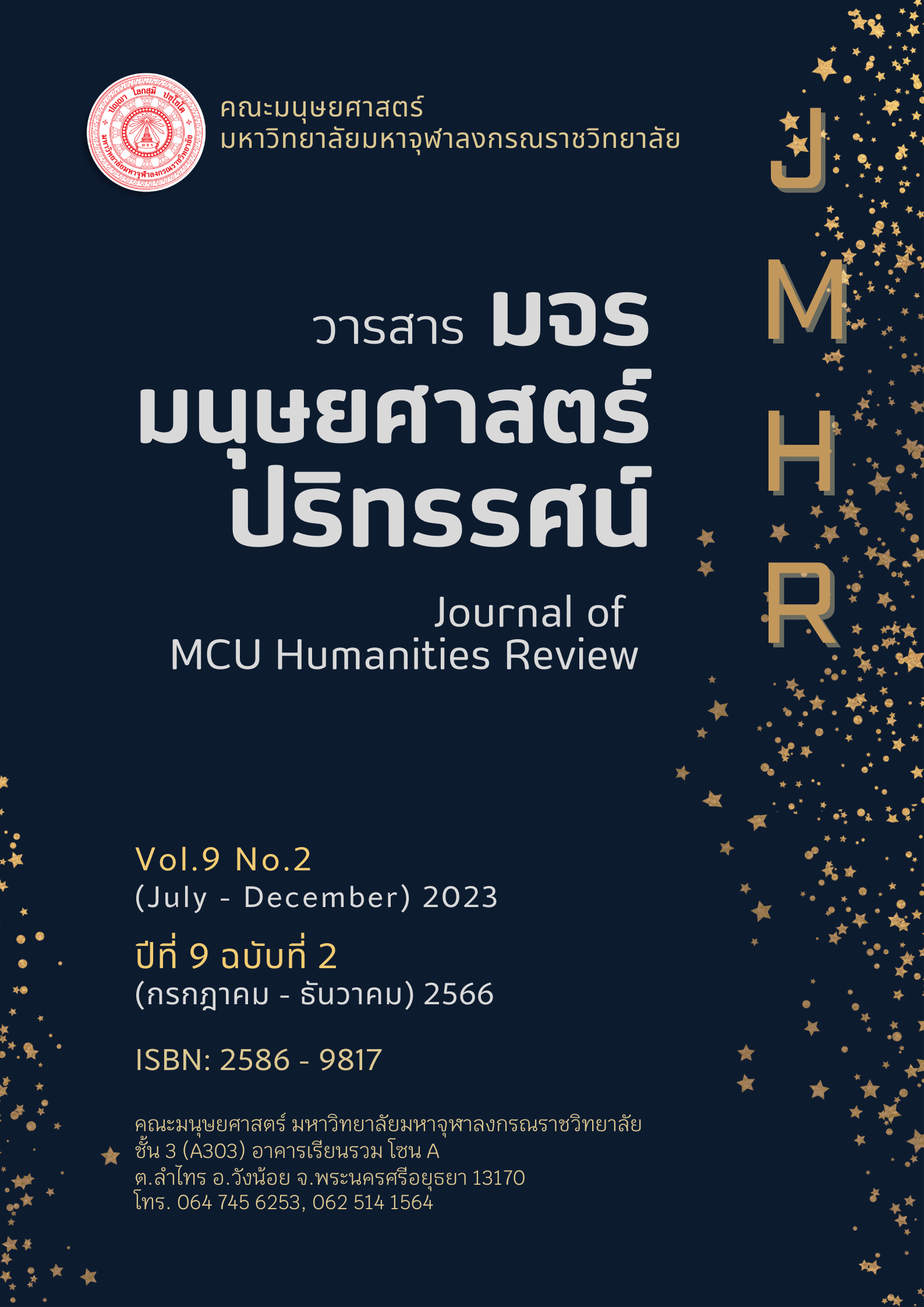การสร้างมนุษยสัมพันธ์ตามแนวพุทธจิตวิทยา
คำสำคัญ:
มนุษยสัมพันธ์, พุทธจิตวิทยา, จิตวิทยาบทคัดย่อ
การสร้างมนุษยสัมพันธ์ตามแนวพุทธจิตวิทยาเป็นทั้งศาสตร์และศิลป์ที่ช่วยให้มนุษย์อยู่ร่วมกันได้อย่างปกติสุข มนุษยสัมพันธ์เป็นคุณสมบัติที่บ่งบอกความเป็นตัวตนของมนุษย์และเป็นวิธีการที่ต้องใช้ในการโน้มน้าวจูงใจผู้อื่น การรู้จักยกย่องให้เกียรติซึ่งกันและกัน การรู้จักเอาใจเขามาใส่ใจเรา การรู้จักให้อภัยต่อกัน ความสำคัญของมนุษยสัมพันธ์ก่อให้เกิดความเข้าใจซึ่งกันและกัน มีความสนิทสนม รักใคร่ช่วยเหลือ มีความเคารพกันและกัน อันนำไปสู่การอยู่ร่วมกันและร่วมมือกันทำกิจกรรมให้สำเร็จลุล่วงไปได้ด้วยดีตามเป้าหมาย
การสร้างมนุษยสัมพันธ์ตามแนวพุทธจิตวิทยา ยึดหลักพุทธธรรมที่มีประโยชน์ต่อมนุษยสัมพันธ์ในสังคม ได้แก่ หลักสังคหวัตถุ 4 ประการอันประกอบด้วย 1) ทาน หมายถึง การให้ ซึ่งการให้ในที่นี้ควรอยู่บนพื้นฐานการให้ด้วยใจบริสุทธิ์ ยินดีที่จะให้ไม่ทุกข์ใจที่จะให้การเอื้อเฟื้อเผื่อแผ่ การเสียสละ 2) ปิยวาจา หมายถึง การกล่าววาจาอันเป็นที่รัก วาจานั้นหมายรวมถึง การสื่อสารซึ่งเป็นพื้นฐานสำคัญของการปฏิสัมพันธ์กัน การพูดด้วยไมตรี ไม่นินทา พูดด้วยความจริงใจ ไม่เสแสร้งโกหก 3) อัตถจริยา หมายถึง การกระทำใด ๆ ก็ตามที่ก่อให้เกิดประโยชน์กับทั้งตนเองและผู้อื่น ไม่ทำให้ผู้อื่นเดือดร้อน ไม่เบียดเบียนเอาเปรียบกัน 4) สมานัตตตา หมายถึง การทำตนเสมอต้นเสมอปลาย ดังนั้น หลักสังคหวัตถุ 4 คือ หลักความเกื้อกูลระหว่างกันของมนุษย์ที่จะช่วยสร้างความสัมพันธ์ที่ดีระหว่างกันทั้งในระดับบุคคลและสังคม อันจะนำมาซึ่งความเข้าใจที่ดีต่อกันของบุคคล และความสงบสุขในสังคมวงกว้างอย่างยั่งยืน
เอกสารอ้างอิง
นิภา มานะการ. (2556). มนุษยสัมพันธ์. กรุงเทพฯ: สำนักพิมพ์เอมพันธ์.
พรรณทิพย์ ศิริวรรณบุศย์. (2550). มนุษยสัมพันธ์. กรุงเทพฯ: สำนักพิมพ์แห่งจุฬาลงกรณ์มหาวิทยาลัย.
พระเทพวิสุทธิกวี. (2527). จิตวิทยาในพระอภิธรรม (พิมพ์ครั้งที่ 3). กรุงเทพฯ: สภาการศึกษามหามกุฎราชวิทยาลัย.
พระเทพวิสุทธิกวี (พิจิตร ฐิตวณุโณ). (2543). การพัฒนาจิต (พิมพ์ครั้งที่ 6). กรุงเทพฯ: มหาวิทยาสัยมหามกุฎราชวิทยาลัย.
พระราชวรมุนี (ประยุตต์ ปยุตโต). ( 2528). พจนานุกรมพุทธศาสตร์ ฉบับประมวลธรรม. กรุงเทพฯ: ด่านสุธาการพิมพ์.
ภาณุวังโส. (2549). เกินกว่าฟรอยด์จะจินตนาการ. กรุงเทพฯ: มายแบงค็อกพับลิชิ่งเฮ้าส์.
มาริษา สุจิตวนิช. (2560). เอกสารประกอบการสอนวิชามนุษยสัมพันธ์ สาขาวิชานิเทศศาสตร์ คณะวิทยาการจัดการ. นครปฐม: มหาวิทยาลัยราชภัฏนครปฐม.
ยงยุทธ วงศ์ภิรมย์ศานติ์. (2547). การวิจัยและพัฒนาการเรียนรู้เพื่อคุณภาพการศึกษา : รายงานการวิจัยฉบับสมบูรณ์โครงการ. กรุงเทพฯ: สำนักงานกองทุนสนับสนุนการวิจัย (สกว.).
ราชบัณฑิตยสถาน. (2554). ความหมายของมนุษยสัมพันธ์. กรุงเทพฯ: นานมีบุ๊ค.
สมพร สุทัศนีย์. (2542). มนุษยสัมพันธ์. กรุงเทพฯ: โรงพิมพ์แห่งจุฬาลงกรณ์มหาวิทยาลัย.
สุทธิพงษ์ ศรีวิชัย. (2560). ทักษะการบริหารมนุษยสัมพันธตามแนวพุทธ (สารนิพนธ์พุทธศาสตรมหาบัณฑิต). มหาวิทยาลัยมหาจุฬาลงกรณราชวิทยาลัย. พระนครศรีอยุธยา.
Dubrin Andrew T. (1981). Human Relations: A Job Oriented Approach. Verginia: Reston Publishing.
Flippo Edwin B. (1979). Management: A Behavioral Approach. Boston: Allyn & bacon.
Halloran, J. W. (1995). Why entrepreneurs fail: avoid the 20 fatal pitfalls of Running your business. Oviedo, Fla: Waterview Press.
Robert M. Fulmer. (1983). The new management. New York: Macmillan; London: Collier Macmillan.
ดาวน์โหลด
เผยแพร่แล้ว
รูปแบบการอ้างอิง
ฉบับ
ประเภทบทความ
หมวดหมู่
สัญญาอนุญาต
ลิขสิทธิ์ (c) 2023 วารสาร มจร มนุษยศาสตร์ปริทรรศน์

อนุญาตภายใต้เงื่อนไข Creative Commons Attribution-NonCommercial-NoDerivatives 4.0 International License.






